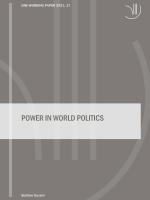The journey of power in international theory
Forthcoming in the Oxford Research Encyclopedia of Politics, this critical survey analyses the various concepts and analyses of power in international theory since World War II.
It shows that there is no single concept or analysis, indeed, there cannot be one given the different purposes for which power is used in political theory, explanatory theory and in the diplomatic field. Power has been central for defining the very nature of politics, for providing either the main explanatory cause or the main outcome of political processes, and for its role in international society where it conventionally attaches rank but also responsibility to power holders.
After showing how classical realism in International Relations tried to combine these three fields through the concept of power, an enterprise that did not work, it elaborates the many ways in which power has been used in explanatory theories, where it came to include both relational and structural approaches. Power is not in resources, but in the relation of actors. And those relations are embedded in a social context that is systematically biased in favour of certain values, views and hence actors.
It finally covers more recent approaches in International Political Sociology that approach power also in its reflexive component. How we define and measure power is not just a description of world affairs, but interacts with it, as when we all changed our ways of seeing the world in a hierarchy of soft, rather than hard, power. The analysis ends on a critical note that the focus on power has played a bad trick on our theorizing. Although it provided a more encompassing and richer study of domination than realism, it also contributed to the obsession with power as the central feature of world politics. Although power is always about politics, not all politics is about power.
